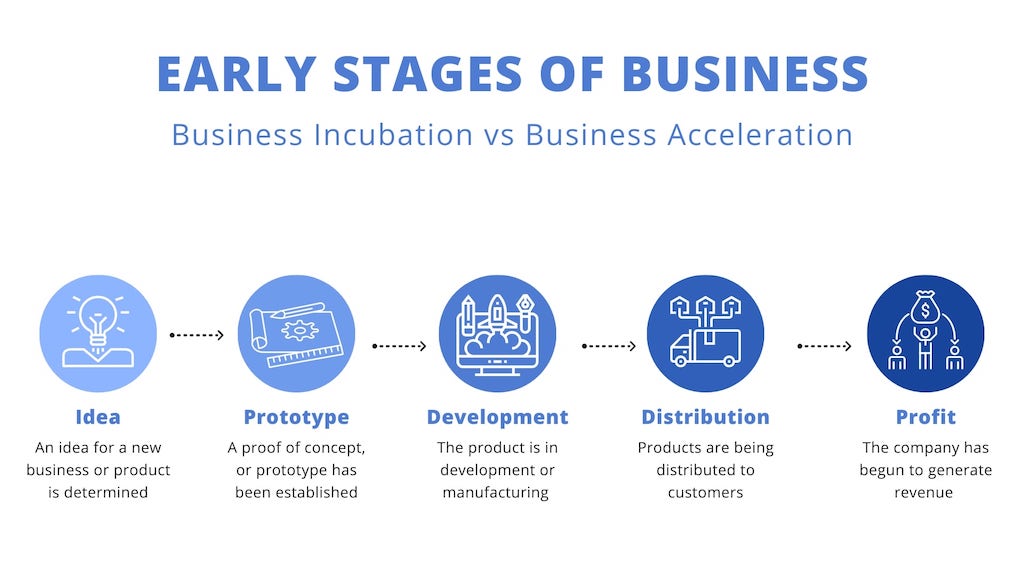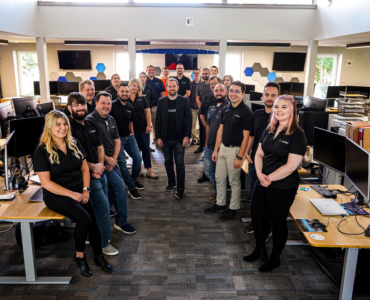The Difference Between a Business Incubator and Accelerator

Growth-stage startups often seek help from mentors and investors to help scale their companies and reach ambitious goals. When they get to this point, intermediate business decision-makers start thinking about business incubators and accelerators as resources to help them achieve success.
Both types of networks are intended to help you achieve business growth. Both connect you with resources, advising, and funding. But, what’s the difference?
What’s the Difference Between a Business Incubator and Business Accelerator?
In theory, incubators are similar to accelerators in that both exist to help startups move to the next stage in business. But there is a core differentiator.
- Business incubators help earlier-staged companies with conventional product development and operational advice.
- Business accelerators tend to help revenue-generating companies find the capital, services, and strategic guidance needed to accelerate growth.
So, your stage in business is key to helping you determine which type of support is best for you at this time.
How Do You Know if Incubation or Acceleration is Right for Your Company?
As stated above, you really need to consider how far you’ve come in business to determine which type of support is best for you. So, let’s take a deeper look at what that means.
A good indicator of whether you’re an early or growth-stage company lies in your revenue generation. If you’re making $1 million per year in business, it’s safe to assume that you’re in need of “acceleration” to advance your strategy. But once you’ve come this far, you may not even need it. And if you’re below such a high threshold, the lines can be a little fuzzy.
So, let’s start by exploring the timeline of a business. First comes an idea, then a design or prototype. After that, you might push your product to market. Unless you’re bootstrapped, you typically need some sort of capital to help you get there.

Business incubator, Chicago
If you’re in the idea or prototype stage, it’s safe to assume that a business incubator would be the most helpful service to leverage.
- Get help creating a prototype or proof of concept
- Find the right developers or manufacturers to bring your idea to life
- Execute a distribution, marketing, and business plan
- Learn to become profitable in business
Yet, if your product is already on the market, but you’re not generating the revenue you would like, you’ll have to look at some numbers to get a better idea of where to turn.
Once Venture Capital becomes an option for your business—when you’ve raised capital or generated revenue of between $500K to $4M—strategic business acceleration is where you should turn. Eventually, you will be able to qualify for debt financing, but you’re not quite there yet.
- Learn from experts who are invested in your company
- Receive guidance on operational changes to generate more revenue
So, in a nutshell, an incubator candidate is a company with a lower valuation and more loosely-defined business model while an accelerator candidate is further along with their business model, has a product or service in the market, and is ready or near ready to talk to more institutional investors.
One of the key aspects of working with a network to help your company grow is that experienced advisors can teach you how to talk to angel investors and venture capitalists about your business. There’s an art to this type of communication and stakeholders want to see that you understand how to scale a business.
[Related: A Complete Guide to Startup Venture Capital]
Incubators and accelerators make money through advisory fees for capital placement or by taking equity in a startup in exchange for funding.
How Will You Find the Right Incubator or Accelerator to Help Grow Your Company?
You can’t just step into any network of growth professionals and find the right fit. Many business innovation groups specialize in specific industries or stages. At the same time, some networks provide both incubation and acceleration services. Some networks serve specific geographic regions.
So, you need to shop around for the right fit. A good incubator or accelerator will have the following qualities:
- Recent experience in your niche
- Proven track record helping businesses at your stage of growth
- A wide network of investors and startups
- Investors that are willing to meet one-on-one with startup leaders
- HR, recruiting, finance, and tech mentorship
If you’re in Illinois, it may be helpful to explore the best incubators in Chicago and find out what each has to offer. If not, check your area and diligently research.
A quick Google search for “business incubator near me” or “best incubators and accelerators” might deliver some awesome results. Just be sure to check for the qualities above.
At Workbox, we think of our network as a family of startups and niche specialists. Members are given access to outstanding business services in an environment that just so happens to provide office space. Our central mission is to give founders access to everything they need to run and grow their companies. We recognize that right now, businesses need these things more than ever.
Our members have access to business coaching and training, connection to funding resources, introduction to a valuable network, and resources to help you establish new tactics and strategies to scale your growth.
Learn more about our Plus Membership.



